2012 – Present: Global Technology Solutions LLC (formerly ProDVD)
Transition to Education Focus:
Establishment of Logistics Institute of Central Asia (LICA):
Educational Initiatives:
Training and Development Focus:
Consulting Services:
The Kuehne Foundation and the AUCA cordially invites you to the first International Logistics and Supply Chain Management (LSCM) seminar in Bishkek, on 3-5 June 2015, with the theme “LSCM for Enterprises: Challenges, Innovations, and Practical Advice.”
LSCM have nowadays become one of the key success factors in the globalized business world by orchestrating different business functions into an integrated process throughout the entire supply chain from the raw material supplier to the end-customer. Many enterprises have shown the trend that the LSCM contribute significantly to the profitability of an organization and the economic development (GDP) of a country.LSCM are the backbones of successful participation in globalized trades. As such, governments, public and private organizations, as well as universities have gained raising interest in the creation of sophisticated knowledge and expertise in this industry.
However, the Kyrgyz Republic is currently losing ground globally in the logistics sector. Falling from a worldwide rank of 91st in the 2000 Logistics Performance Index to 130th in 2012, the country is currently rated as 149th out of 160 countries measured. For this sector to improve,the country needs a renewed focus on education, innovation, and policy by all relevant parties. Many countries in CA are facing similar needs and challenges.
The seminar is designed for representatives of government, commerce, and industry sectors. The seminar will be conducted by experts and practitioners of international level. The content of the lecture and workshop is based on the LSCM materials of the International Trade Center (ITC), Geneva, Switzerland. At the end of the workshop, participants receive an international certificate.
With best regards,
LSCM Seminar Committee
Benefits for Participants
High quality seminar given by international faculty/practitioners based on the MLS-SCM of the International Trade Centre (ITC), Geneva, Switzerland;
Gain understanding on LSCM as a cross-functional and competitive element;
Practical and cost saving application tool kits;
Receipt of valuable certificate issued by Kuehne Foundation and AUCA;
Earn course credit for under/graduate programs;
Become part of the Central Asian and Kyrgyzstan LSCM community;
Develop partnership and alliance opportunities.
Language
Delivered in English and simultaneously translated to Russian.
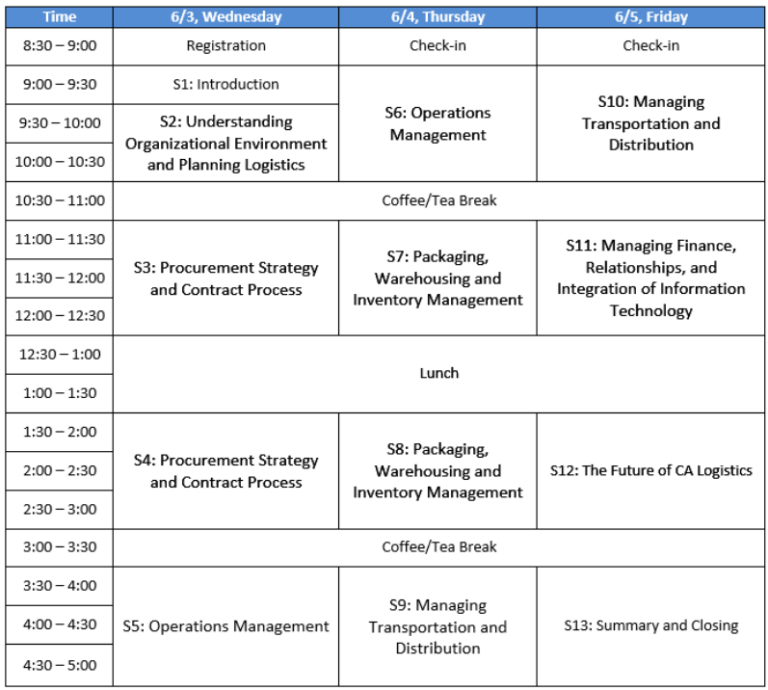
PART I: First LSCM REGIONAL CONFERENCE in Central Asia :
“Logistics Management for the development of the economy”
Date and Time: 18 May 2016, 08:30 am – 12:30 pm
Location: City Hotel, Bishkek, Kyrgyz Republic
Format: Registration Required, No Fee
Working language: Russian (Translated to English)
Moderators: T.Koichumanov, K. Itibaev
PART II: Second LSCM INTERNATIONAL SEMINAR IN Central Asia :
“LSCM Skills for Global Trade and Job Promotion in Central Asia”
Date and Time: 18-20 May 2016
Location: Bishkek, Kyrgyz Republic, “City Hotel”
Format: Registration Required with Fee
Working language: English/Russian (Simultaneous Translation Available)
Moderator: K. Itibaev
Registration Fee
PAYMENT PROCESS:
1) You will need to register in this website to receive an invoice
2) AUCA will issue an invoice (to your e-mail)
3) Pay/wire the fee to AUCA KICB account or come to AUCA Finance
4) Payment must be made prior to seminar date to secure a discount and to reserve a seat (we have limited space)
5) Receipt will be given during the seminar check-in
Location
18 May (Wednesday)
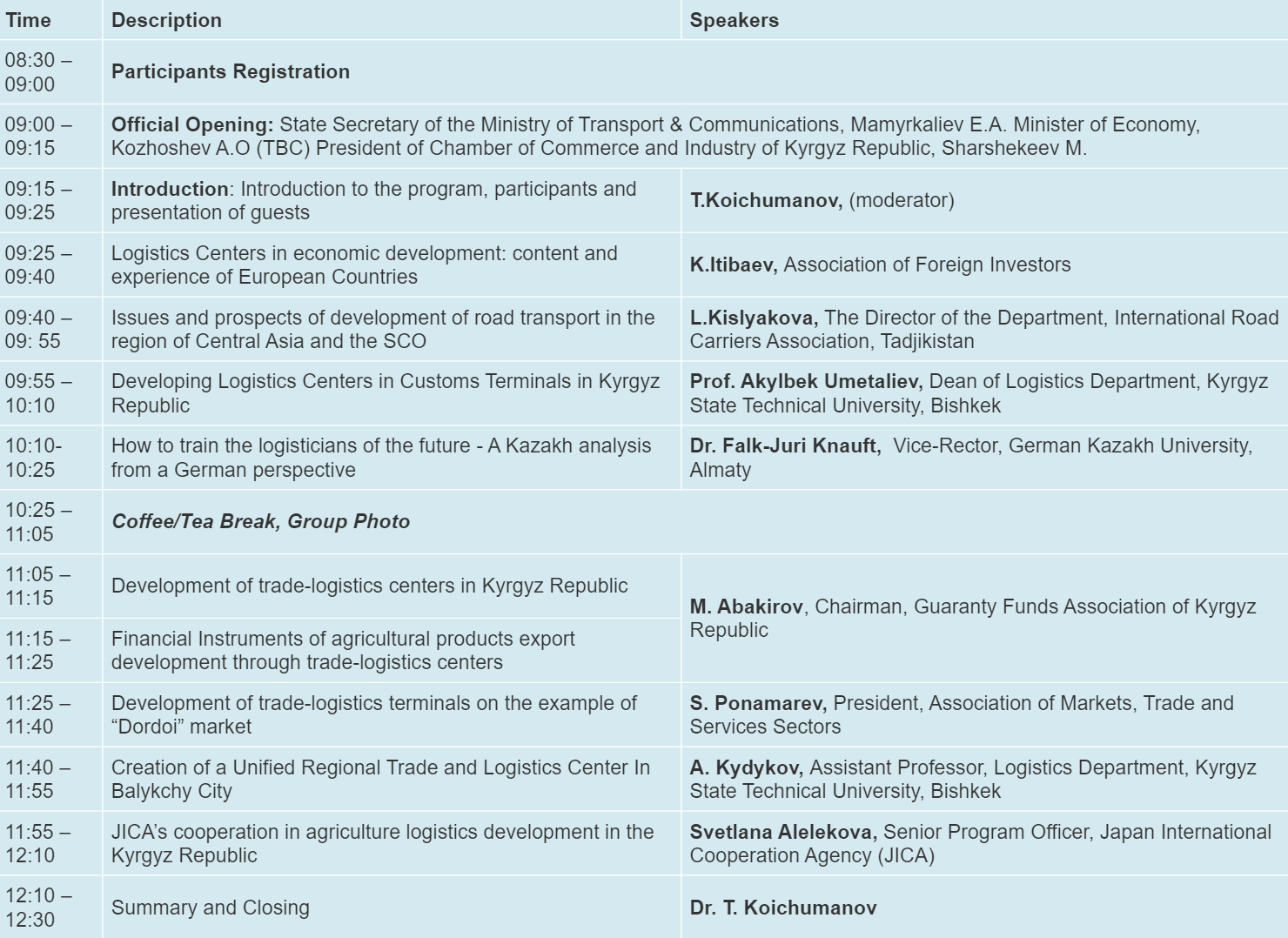
18 May (Wednesday)

19 May (Thursday)

20 May (Friday)

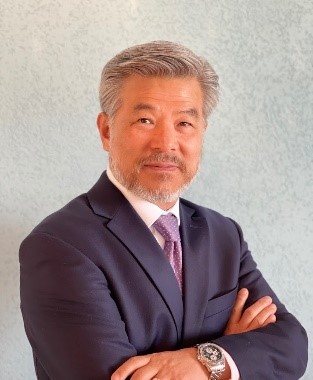
Dr. Denny Cho Ph.D., University of Pennsylvania, USA M.B.A., Widener University, USA M.S., University of Tennessee Space Institute, USA B.S., The Pennsylvania State University, USA.
President, Global Technology Solutions Bishkek, Kyrgyzstan
Professor, AUCA Bishkek, Kyrgyzstan
Tel. (996) 312 66 11 14
Email: cho.denny@gmail.com; cho_de@auca.kg
Denny J Cho is an experienced Professor in teaching Systems Engineering and Business Management in manufacturing, aviation, decision making, program management, supply chain management, logistics and transportation by connecting principles and theories with real world issues and challenges. Currently, he is working at the MBA/BA Department of the American University of Central Asia as a Professor and also serves as the head of the LSCM program.
Dr. Cho has also taught for both Wharton Business and SEAS Schools at the University of Pennsylvania from 2002-2006. Denny Cho is also a proven and effective Entrepreneur, Program Manager, and Leader with over 30 years of broad, balanced, and overall management and technical experience in developing advanced aviation and IT technologies.
Dr. Cho has established Global Technology Solutions since 2012 to provide business management and technology consulting, IT software program development, and IT hardware technology services. From 1992 to 2011, Dr. Cho worked at The Boeing Company (PA, USA) as Program Manager/Associate Technical Fellow to manage and lead many programmatic and technical activities. He also served as Administrative FAA DER to manage BB609 Type Certification for FAA.
He has excellent business and technical acumen in many aspects of the enterprise value chain, including strategic planning and business development, proposal preparation, technical requirements management, multidisciplinary system design trade and optimization, testing and integration, supplier management, and manufacturing.

Dr. Andre Kreie Ph.D., Heriot-Watt University, Edinburgh MSc, Heriot-Watt University, Edinburgh B.A., German Academy for Foreign Trade and Logistics, Bremen, Germany
Vice Dean, German Academy of Foreign Trade and Logistics (DAV) 28359 Bremen, Germany
Program Manager, Kuehne Foundation 8834 Schindellegi, Switzerland
Tel. +49 151 2757 5056; +41 79 326 78 37
E-mail: andre.kreie@kuehne-stiftung.org; kreie@bvl-campus.de
Andre Kreie is Project Manager with the Kuehne-Foundation based in Schindellegi, Switzerland, and also works as Vice Dean at the German Academy for Foreign Trade and Logistics (DAV) in Bremen, Germany. He is a Business Economist and holds a PhD and Masters in Logistics and Supply Chain Management from Heriot-Watt University, Edinburgh, UK.
Prior to joining the Kuehne Foundation, Andre gained work experience in the supply chain business with a globally operating logistics service provider and worked as project manager for logistics design and operations with a leading European DIY-retailer. Andre has been teaching intensively in business programs at different universities and his research interest is on organizational and network learning, and supply chain risk management to enable the adaptations of logistical systems to a changing environment such as climate change, for example. Present activities for the Kuehne-Foundation involve projects in advanced and higher education in logistics as well as in humanitarian logistics with a particular focus on logistics training of NGO staff.

Dr. Hans Voordijk PhD., Maastricht University (UM)., Netherlands MSc., Erasmus University Rotterdam (EUR), Netherlands MA., Erasmus University Rotterdam (EUR), Netherlands
Associate Professor, Department Construction Management & Engineering Twente University, Netherlands Room
Horsttoren T-313
Tel. +31 (0)53 489 4214
Tel. secretary +31 (0)53 489 4254
Fax +31 (0)53 489 2511
E-mail: j.t.voordijk@utwente.nl
Dr. Hans Voordijk is Associate Professor in Supply Chain Management at the Department of Construction Management and Engineering of the Twente University. Before he joined this university, he was project manager at the Netherlands Organization of Applied Scientific Research (TNO), Assistant Professor at Tilburg University and lecturer at Asmara University, Eritrea.
Hans was member of the Board of Supervisory Directors of Ubbink B.V. He started his career as Research Assistant at the Maastricht Economic Research Institute on Innovation and Technology (MERIT) of Maastricht University. Academic member of the Visualization and Simulation Center of Twente University Member of the University of Twente Initiative of Purchasing Studies (UTIPS). Member of the International Purchasing and Supply Education and Research Association (IPSERA).

Education
Promote the importance of LSCM to the local Government, Commerce, and Industry (GCI) Develop the LSCM education program for the GCI community

Partnership
Develop the LSCM community in Kyrgyz and CA Seek Partnership and Alliance opportunities through LSCM Conference/Seminar.

Research and Application
Conference participation from universities in CA Develop LSCM research opportunities for university faculty and students Develop Internship opportunities for university students.

Industry
Register 50 participants from the CA industry and the government institutions A cost-effective international seminar with international faculty/practitioners as main instructors.
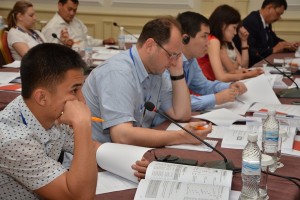

TODAY’S ENTERPRISE ENVIRONMENT1
In today’s business environment, market and economics forces are driving the trend toward globalization and at the same time an enterprise is facing increased competitions, smarter and more demanding customers, less brand loyalties, and shorter product life cycles and longer supply chains. In this globally competitive business environment, the creation of customer value is a key driver of competitive advantage, and this customer value should be measured in price, quality, and time in providing products and services to domestic and international customers. At the enterprise level, the design of value chain is intimately linked with the management of operations and supply chains. Operations, as core activities of most business organizations, are the sequence of value-adding processes that manufacture goods or provide services. Operations activities, including production, are directly impacted by the effectiveness of logistics and supply chain management, particularly and significantly by procurement, transportation, distribution, and inventory management functions.

CA REGION INTEGRATION2
There are many reasons for the poor performance of economy and global trade in Central Asia. In additional to being landlocked, the distance between Central Asia and major global markets and the high cost of transportation limit or even prevent trade. The current realities are high costs and long delays moving goods over long distances, and these conditions do not encourage many enterprises to keep pace with global developments in their industry to become globally competitive. These impediments to trade cut off the most important avenue for their expansion and discourage firms from developing the expertise and scale of production that would allow them to compete in the region or beyond.
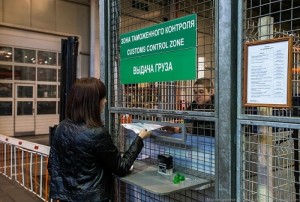
TRANSPORT AND LOGISTICS SECTOR3
The improved transport connectivity and border practices mean faster, cheaper transportation facilitating and increasing trade within the region and beyond. Good transport and logistics services enhance competitiveness and trade in every sector of economy and are the heart of the global supply chain. The transport logistics industry includes all the services that are needed to move goods across borders to final destinations. Good logistics services are essential for perishable goods and just-in-time shipments that cross multiple borders and intermodal transfers.
1 AUCA MBA 536 SUPPLY CHAIN MANAGEMENT COURSE SYLLABUS
2 REQUEST FOR PROPOSALS (RFP) RFP NO.: SOL-176-16-000001, USAID COMPETITIVENESS, TRADE AND JOBS (CTJ) ACTIVITY IN CENTRAL ASIA
3 REQUEST FOR PROPOSALS (RFP) RFP NO.: SOL-176-16-000001, USAID COMPETITIVENESS, TRADE AND JOBS (CTJ) ACTIVITY IN CENTRAL ASIA
GOALS OF TTT
Train LSCM instructors to be able to teach/train future logistics specialists in government, industry, and university:
Build a network of LSCM instructors for collaboration on these following activities:
Through TTT, it is a desire of GTS/Kuehne to build up a highly capable LSCM workforce in Kyrgyz and CA in the near future.
BENEFITS OF PARTICIPANTS
PRIORITY AREAS:
Basic Teaching Strategy and Effective Techniques
Basic strategies and concepts, global logistics, customer value, operations research, international business and contract
E-procurement, purchasing strategies and negotiation, forecasting and decision making, inventory models, manufacturing and operations, quality management, and MRP/ERP
Distribution networks, warehousing and logistics centers, routing and scheduling, Transportation-Inventory cost modeling, and fleet sizing
IOT integration, logistics information systems, urban transportation and city planning, humanitarian logistics, and sustainable development
28 November (Monday)

29 November (Tuesday)

30 November (Wednesday)

01 December (Thursday)

02 December (Friday)
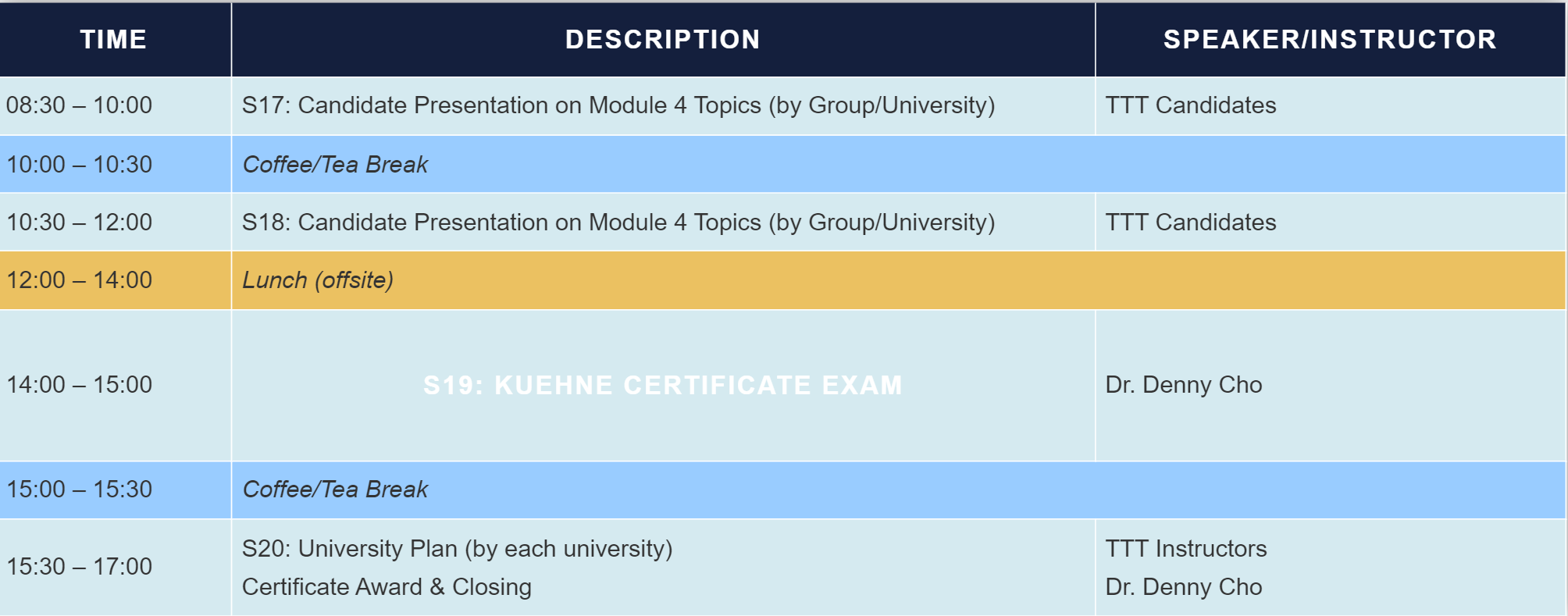

TODAY’S ENTERPRISE ENVIRONMENT1
In today’s business environment, market and economics forces are driving the trend toward globalization and at the same time an enterprise is facing increased competitions, smarter and more demanding customers, less brand loyalties, and shorter product life cycles and longer supply chains. In this globally competitive business environment, the creation of customer value is a key driver of competitive advantage, and this customer value should be measured in price, quality, and time in providing products and services to domestic and international customers. At the enterprise level, the design of value chain is intimately linked with the management of operations and supply chains. Operations, as core activities of most business organizations, are the sequence of value-adding processes that manufacture goods or provide services. Operations activities, including production, are directly impacted by the effectiveness of logistics and supply chain management, particularly and significantly by procurement, transportation, distribution, and inventory management functions.

CA REGION INTEGRATION2
There are many reasons for the poor performance of economy and global trade in Central Asia. In additional to being landlocked, the distance between Central Asia and major global markets and the high cost of transportation limit or even prevent trade. The current realities are high costs and long delays moving goods over long distances, and these conditions do not encourage many enterprises to keep pace with global developments in their industry to become globally competitive. These impediments to trade cut off the most important avenue for their expansion and discourage firms from developing the expertise and scale of production that would allow them to compete in the region or beyond.

TRANSPORT AND LOGISTICS SECTOR3
The improved transport connectivity and border practices mean faster, cheaper transportation facilitating and increasing trade within the region and beyond. Good transport and logistics services enhance competitiveness and trade in every sector of economy and are the heart of the global supply chain. The transport logistics industry includes all the services that are needed to move goods across borders to final destinations. Good logistics services are essential for perishable goods and just-in-time shipments that cross multiple borders and intermodal transfers.
1 AUCA MBA 536 SUPPLY CHAIN MANAGEMENT COURSE SYLLABUS
2 REQUEST FOR PROPOSALS (RFP) RFP NO.: SOL-176-16-000001, USAID COMPETITIVENESS, TRADE AND JOBS (CTJ) ACTIVITY IN CENTRAL ASIA
3 REQUEST FOR PROPOSALS (RFP) RFP NO.: SOL-176-16-000001, USAID COMPETITIVENESS, TRADE AND JOBS (CTJ) ACTIVITY IN CENTRAL ASIA
Global Technology Solutions and Kühne Foundation conduct an annual international seminar on logistics and supply chain management. Experts from the United States, Switzerland, the United Kingdom and Canada provide training and consulting to academia, business and government in the area of international logistics. Participants study the latest trends in logistics and use their acquired knowledge to improve their work and promote the development of the countryʼs economy.
April 3 (Monday)
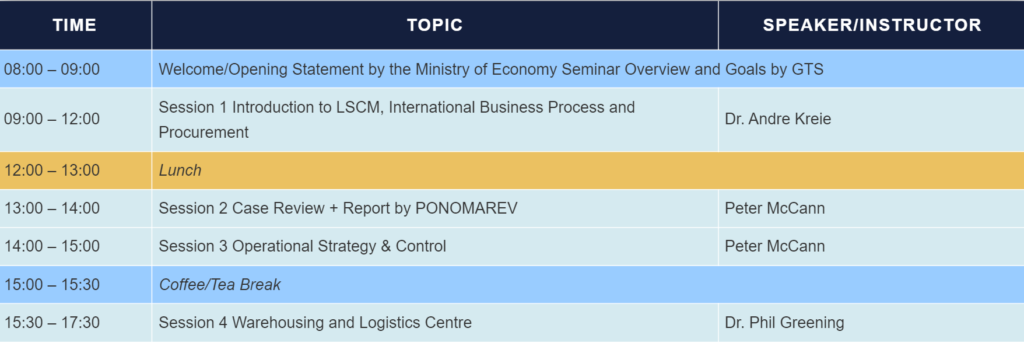
April 4 (Tuesday)

April 5 (Wednesday)

2nd TRAIN-THE-TRAINER OF LOGISTICS AND SUPPLY CHAIN MANAGEMENT (TTT OF LSCM) BY LOGISTICS EXCELLENCE CENTRE IN CA (LECCA) OF GTS/KUEHNE FOUNDATION
DATE AND LOCATION:
2nd PHASE: ADVANCED CONTENT OF LSCM
6-7-8 April 2017
“Ak-Maral” resort, Issyk-Kul, Kyrgyz Republic
WORKING LANGUAGE: ENGLISH
MAIN INSTRUCTOR:
REGISTRATION AND REQUIREMENT:
PARTICIPANTS AND PREREQUISITES:
BACKGROUND
The world has been rapidly changing, and markets that were previously inaccessible are opening up and now offer great opportunities for firms to expand and develop. This increase in global business has also increased the pressure on global logistics channels and infrastructure. In addition, we have seen a radical shift in power from sellers to buyers in business relationships as customers now have easy access to information about the product, price, quality, manufacturing and even to distribution cost. As a result, customers now have more access to product and service choices than ever before in the global market. In this global business environment, the creation of customer value is a key driver of competitive advantage. At the enterprise level, the design of the value chain is intimately linked with the management of a supply chain and its logistics operation. In essence, logistics and supply chain management represents a unified cross-functional process by which good and services would be produced for customers and delivered for their consumption. As a result, logistics and supply chain management is now developed into a core component of the corporate strategy and profitability.
There are reasons for the poor performance of the local economy and business and global trade in Central Asia. In additional to being landlocked, the distance between Central Asia and major global markets and the high cost of transportation limit or even prevent trade. The poor logistics and transportation infrastructure of this mountain region has been a limiting factor to the regional economic and business development activities. The current realities are high costs and long delays in moving goods over long distances in Central Asia, and these impediments to trade cut off the most important avenue for their expansion and discourage firms from developing the expertise and scale of production that would allow them to compete in the Central Asia region or beyond. In addition, the lack of trained and experienced logistics specialists is further degrading the current regional economic and business growth and not fully benefiting the future opportunities in the global market.
The improved transport connectivity and border practices can mean faster and cheaper transportation facilitating and increasing trade within the region and beyond. Good transport and logistics services managed by the skilled logistics specialists can enhance competitiveness and trade in every sector of economy. An upgrade service provided by the transport logistics industry will enhance all the economic activities in producing and moving goods across multiple borders.
Given these global logistics trends and modern challenges of our region, the main objectives of this Train-the-Trainer (TTT) is to train and equip local instructors and professionals working in the logistics related fields with the latest and advanced knowledge, skills, and tools to train regional university students and prepare them for global logistics market and economic activities. We believe that this TTT will serve as a catalyst in quickly building up the local logistics capacity and a sizable labor force that is urgently needed in CA at this point and thus energize regional economic and business activities.
UNIVERSITY AND GOVERNMENT INVOLVEMENT
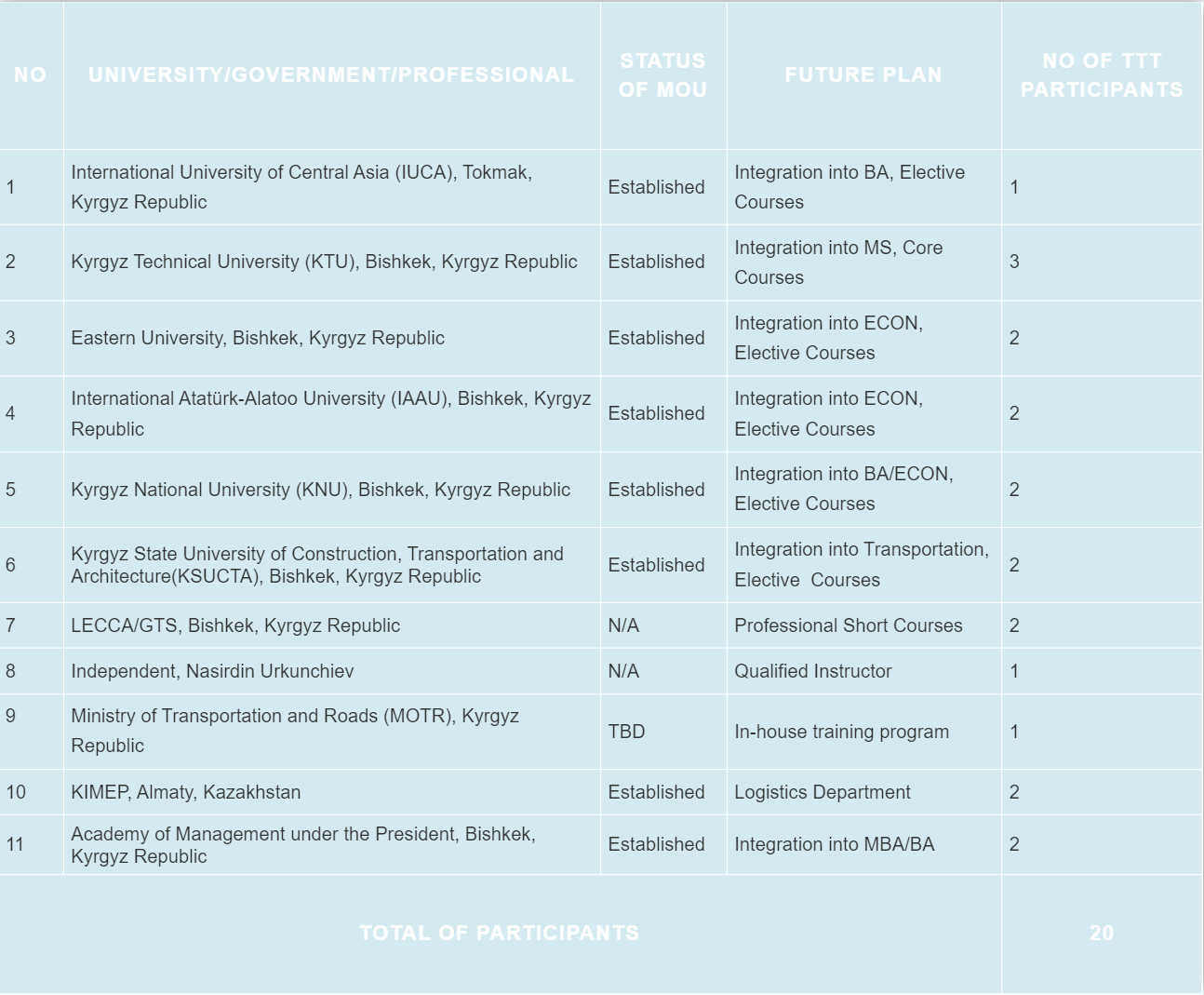
April 5 (Wednesday)

April 6 (Thursday)
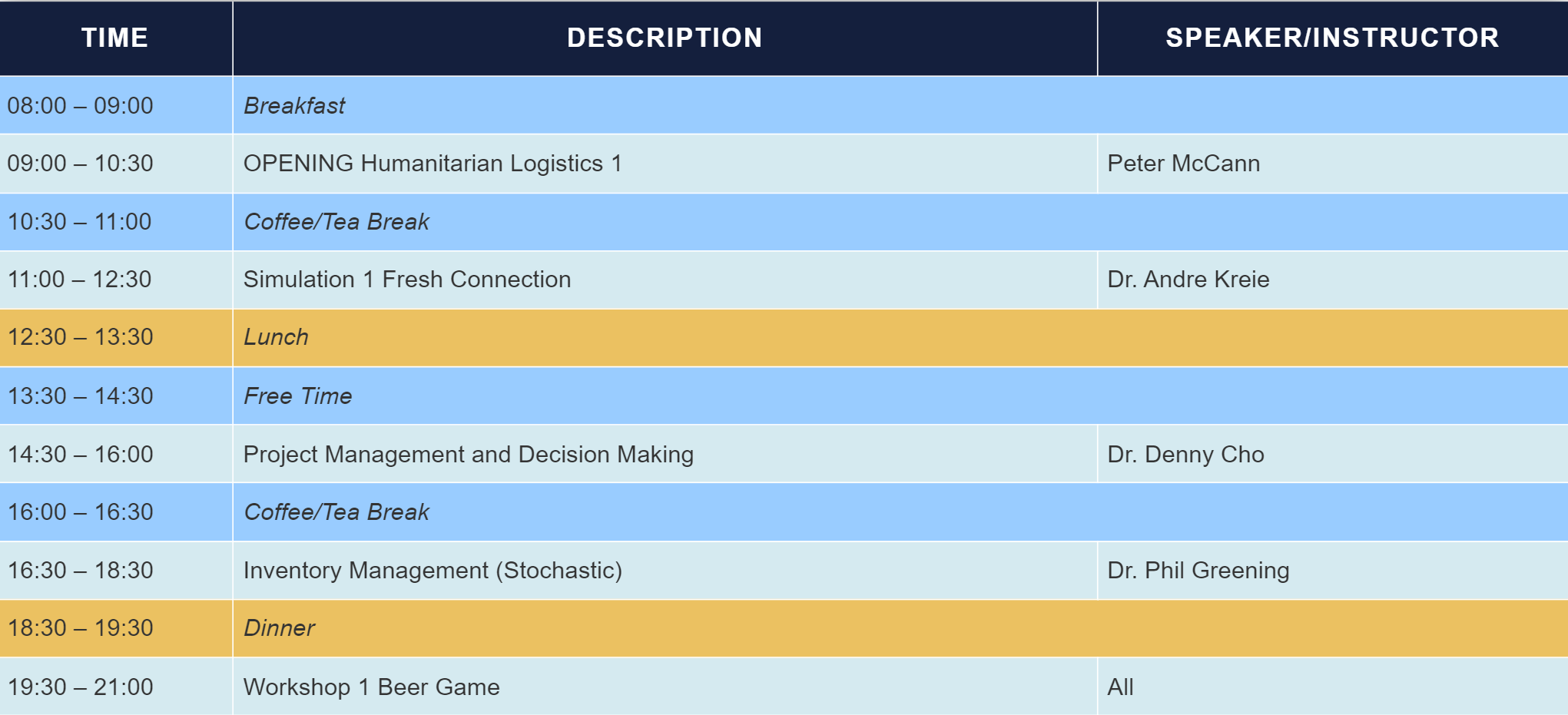
April 7 (Friday)

April 8 (Saturday)

Basic Teaching Strategy and Effective Techniques
Module 1, Introduction to Logistics and Supply Chain Management
Basic strategies and concepts, global logistics, customer value, operations research, international business and contract
Module 2, Inventory Management and Procurement
E-procurement, purchasing strategies and negotiation, forecasting and decision making, inventory models, manufacturing and operations, quality management, and MRP/ERP
Module 3, Transportation and Distribution
Distribution networks, warehousing and logistics centers, routing and scheduling, Transportation-Inventory cost modeling, and fleet sizing
Module 4, Applied LSCM
IOT integration, logistics information systems, urban transportation and city planning, humanitarian logistics, and sustainable development

TODAY’S ENTERPRISE ENVIRONMENT1
In today’s business environment, market and economics forces are driving the trend toward globalization and at the same time an enterprise is facing increased competitions, smarter and more demanding customers, less brand loyalties, and shorter product life cycles and longer supply chains. In this globally competitive business environment, the creation of customer value is a key driver of competitive advantage, and this customer value should be measured in price, quality, and time in providing products and services to domestic and international customers. At the enterprise level, the design of value chain is intimately linked with the management of operations and supply chains. Operations, as core activities of most business organizations, are the sequence of value-adding processes that manufacture goods or provide services. Operations activities, including production, are directly impacted by the effectiveness of logistics and supply chain management, particularly and significantly by procurement, transportation, distribution, and inventory management functions.

CA REGION INTEGRATION2
There are many reasons for the poor performance of economy and global trade in Central Asia. In additional to being landlocked, the distance between Central Asia and major global markets and the high cost of transportation limit or even prevent trade. The current realities are high costs and long delays moving goods over long distances, and these conditions do not encourage many enterprises to keep pace with global developments in their industry to become globally competitive. These impediments to trade cut off the most important avenue for their expansion and discourage firms from developing the expertise and scale of production that would allow them to compete in the region or beyond.

TRANSPORT AND LOGISTICS SECTOR3
The improved transport connectivity and border practices mean faster, cheaper transportation facilitating and increasing trade within the region and beyond. Good transport and logistics services enhance competitiveness and trade in every sector of economy and are the heart of the global supply chain. The transport logistics industry includes all the services that are needed to move goods across borders to final destinations. Good logistics services are essential for perishable goods and just-in-time shipments that cross multiple borders and intermodal transfers.
1 AUCA MBA 536 SUPPLY CHAIN MANAGEMENT COURSE SYLLABUS
2 REQUEST FOR PROPOSALS (RFP) RFP NO.: SOL-176-16-000001, USAID COMPETITIVENESS, TRADE AND JOBS (CTJ) ACTIVITY IN CENTRAL ASIA
3 REQUEST FOR PROPOSALS (RFP) RFP NO.: SOL-176-16-000001, USAID COMPETITIVENESS, TRADE AND JOBS (CTJ) ACTIVITY IN CENTRAL ASIA
Benefits for Participants
1) High quality seminar given by international faculty/practitioners based on the International Trade Centre (ITC) and Kuehne materials
2) Gain understanding on LSCM as a cross-functional and competitive element
3) Practical and cost saving application tool kits
4) Receipt of valuable certificate issued by Kuehne Foundation and GTS
5) Become part of the CA and Kyrgyz LSCM community
6) Develop partnership and alliance opportunities
Schedule and Candidate Venue
Program and Language (topics)
Registration Fee
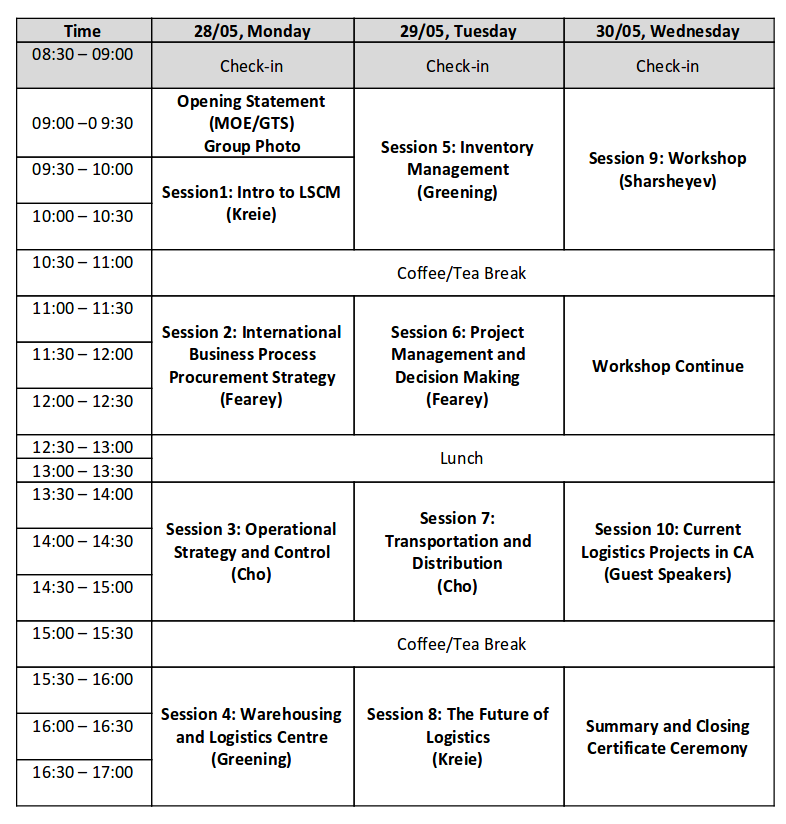
Dr. Denny Cho President Global Technology Solutions Professor (AUCA, Kyrgyzstan/University of Pennsylvania, USA) Doctor of Engineering, University of Pennsylvania, USA М.В.А., Widener University, USA M.S., University of Tennessee Space Institute, USA B.S., The Pennsylvania State University, USA

Denny J Cho is an experienced Professor in teaching Systems Engineering and Business Management in manufacturing, aviation, decision making, program management, supply chain management, logistics and transportation by connecting principles and theories with real world issues and challenges. Currently, he is working at the MBA/BA Department of the American University of Central Asia as a Professor and also serves as the head of the LSCM program.
Dr. Cho has also taught for both Wharton Business and SEAS Schools at the University of Pennsylvania from 2002-2006. Denny Cho is also a proven and effective Entrepreneur, Program Manager, and Leader with over 30 years of broad, balanced, and overall management and technical experience in developing advanced aviation and IT technologies. Dr. Cho has established Global Technology Solutions since 2012 to provide business management and technology consulting, IT software program development, and IT hardware technology services.
From 1992 to 2011, Dr. Cho worked at The Boeing Company (PA, USA) as Program Manager/Associate Technical Fellow to manage and lead many programmatic and technical activities. He also served as Administrative FAA DER to manage BB609 Type Certification for FAA. He has excellent business and technical acumen in many aspects of the enterprise value chain, including strategic planning and business development, proposal preparation, technical requirements management, multidisciplinary system design trade and optimization, testing and integration, supplier management, and manufacturing.
Dr. Andre Kreie Vice Dean, German Academy of Foreign Trade and Logistics, Germany PhD, Heriot-Watt University, Edinburgh MSc, Heriot-Watt University, Edinburgh В.А., German Academy of Foreign Trade and Logistics, Bremen, Germany

Andre Kreie is Director Global Logistics Education with the Kühne – Foundation based in Schindellegi, Switzerland, and also works as Vice Dean at the German Academy for Foreign Trade and Logistics (DAV) in Bremen, Germany. He is a Business Economist and holds a PhD and Masters in Logistics and Supply Chain Management from Heriot-Watt University, Edinburgh, UK.
Prior to joining the Kühne Foundation, Andre gained work experience in the supply chain business with a globally operating logistics service provider and worked as project manager for logistics design and operations with a leading European DIY-retailer. Andre has been teaching intensively in business programs at different universities and his research interest is on organizational and network learning, and supply chain risk management to enable the adaptations of logistical systems to a changing environment such as climate change, for example. Present activities for the Kühne Foundation involve projects in advanced and higher education in logistics as well as in humanitarian logistics with a particular focus on logistics training of NGO staff.
Dr. Phil Greening PhD, Cranfield University, UK MSc. Cranfield University, UK Director of the Centre for Sustainable Freight Road Associate Professor, Heriot Watt University and Cambridge University

Dr. Phil Greening, is the Research Manager and Commercial Director for the Centre of Sustainable Road Freight, his research interests include complexity, risk in supply chains, road freight, green logistics, and computer modelling of complex systems. Prior to joining academia Dr. Greening held the post of Senior Supply Chain Consultant with a global logistics company, responsible for the delivery of over 30 consultancy assignments.
Dr. Greening joined Cranfield University in 2010 to help build a computer simulation of freight movements across the UK. Having completed this project in 2013 he became a Director of the Centre for Sustainable Road Freight, a collaborative venture between Heriot Watt University and Cambridge University funded by industry and government. The Centre is currently engaged in a 5 year program of work incorporating 12 projects addressing the engineering and organizational issues of sustainable road freight.
Seth G. Fearey – Assistant Professor at the American University of Central Asia, Former Country Director of the Peace Corps in the Kyrgyz Republic, MBA Stanford University, USA, Chair of the Board of KG Labs, Bishkek

Seth Fearey has worked the private, public, social, and academic sectors. He spent 30 years in the high-tech sector in California’s Silicon Valley. For twenty of those years he worked in a variety of management positions at Hewlett-Packard, including marketing, finance, information systems, public policy, philanthropy, and strategic planning.
He was an early champion of the Internet, forming an NGO and a consulting business to help communities develop plans to use the Internet to create jobs and improve quality of life. Seth applied industry cluster analysis to help create Internet and renewable energy clusters in Silicon Valley, and a movie studio cluster in Southern California.
Seth G. Fearey – Assistant Professor at the American University of Central Asia, Former Country Director of the Peace Corps in the Kyrgyz Republic, MBA Stanford University, USA, Chair of the Board of KG Labs, Bishkek.
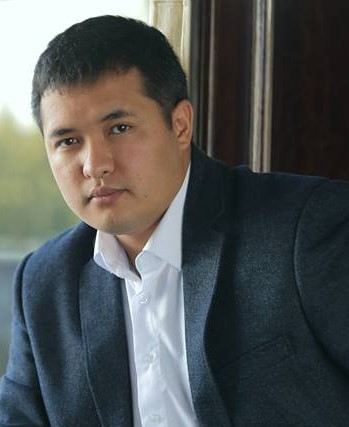
Iskender Sharsheyev is an economist, Executive Chairman of the Foreign Investors Association and Chairman of the Foreign Entrepreneurship Support Committee under the Chamber of Commerce and Industry of the Kyrgyz Republic. He is the author of the book “Prosperity System: A Libertarian View of the Economic Structure of the Kyrgyz Republic” and “Kyrgyz Way: Book for the presidents.” Mr. Sharsheyev has over 10 years of experience in the development of financial, insurance, hospitality, and tourism businesses in the Kyrgyz Republic. He is Expert in Business-Planning and Feasibility Study for investment projects.
DATE AND PLACE
STAGE 3: IMPROVING KNOWLEDGE OF LSCM
26-30 November 2018
Recreation center “Raduga West”, Issyk-Kul, Kyrgyz Republic
WORKING LANGUAGE: ENGLISH
MAIN INSTRUCTORS:
Dr. Denny J. Cho, President, GTS, Kyrgyzstan; Professor at KTU named after Razzakov, AUCA, Kyrgyzstan (UPENN Wharton/SEAS, USA)
Dr. André Krije, Vice Dean, German Academy for International Trade and Logistics, Germany; Program Manager, Kuehne Foundation, Switzerland
Christine Rutherford, PhD (Logistics), MSc (Chemistry), Heriot-Watt University, England.
PARTICIPANTS:
University professors currently teaching logistics and/or related fields of study
GENERAL INFORMATION
The world is changing at a rapid pace and markets that were previously inaccessible are now opening up and offering huge opportunities for expansion and development. This increase in global business has also increased the pressure on global logistics channels and infrastructure. In addition, we have seen a radical shift in power from sellers to buyers in business relationships as customers now have easy access to product information, pricing, quality, manufacturing and even shipping costs. As a result, customers now have greater access to products and service choices than ever before in the global marketplace. In this global business environment, creating customer value is a key driver of competitive advantage. At the enterprise level, supply chain design is closely linked to supply chain management and logistics operations. That is, logistics and supply chain management is a single cross-functional process where goods and services are produced for customers and delivered to end consumers. As a result, logistics and supply chain management is becoming a core component of corporate strategy and profitability.
There are several reasons for the poor performance of the economy, business and global trade in Central Asia. In addition, being a landlocked country, the distance between Central Asia and the main world market represents high transportation costs, limiting or even preventing trade in any goods or services.
Inefficient logistics and underdeveloped transport infrastructure in the mountainous region are becoming the main reason for limiting the activity of the regional economy as a whole and business development. As a result, we currently have high costs and long delays in moving goods and services over long distances in Central Asia, and these are huge barriers to trade that limit the most important path for development, expansion of companies from developing countries, whose experience and scale could compete both in Central Asia and beyond.
In addition to the above reasons, one can also add the lack of qualified and experienced logistics professionals for the current regional economic and business growth and the failure to fully exploit the country’s future opportunities in global trade.
Improved transport links and efficient practices of moving goods across borders mean fast and cheap transportation, which facilitates and expands trade within the region and beyond. Efficient transport and logistics services managed by qualified and experienced professionals contribute to increased competitiveness and high trade in every sector of the economy. Highly qualified service provided by the transport logistics industry improves all sectors of economic activity in the production and delivery of goods across multiple borders. Considering the global logistics trends and contemporary challenges of our region, the main objective of this ToT program is to prepare and equip local logistics professionals and trainers with the knowledge and skills for further training in the global logistics and economic activity in general. We believe that this ToT program will serve as a catalyst for rapidly growing local logistics capacity and significant manpower that is urgently needed to support and enhance regional economic and business activities.



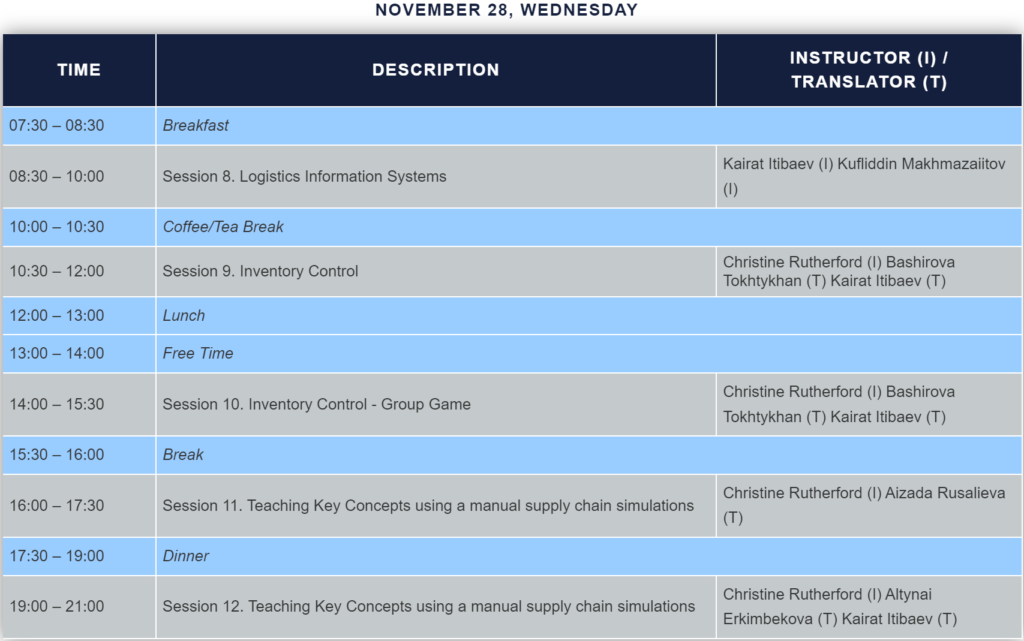
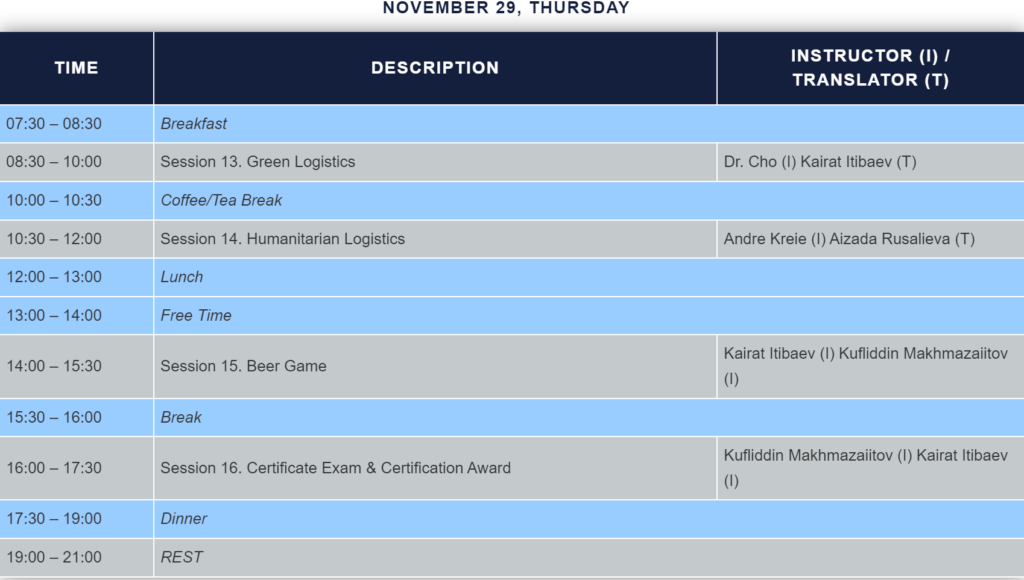


In today’s business environment, market and economic forces are driving the trend of globalization. At the same time, businesses face increased competition, more demanding customers, less brand loyalty, shorter product life cycles, and longer supply chains. In a competitive business environment, creating customer value is a key factor in competitive advantage, and the value created should be measured by the price, quality, and delivery time of goods and services to domestic and foreign markets. In the enterprise context, chain design is closely related to operations and supply chain management. Operations, which are the core activities of most business organizations, are a series of processes that add value to the goods produced or services provided. Operations, including manufacturing, are directly affected by the effectiveness of logistics and supply chain management, in particular the purchasing, transportation, distribution, and inventory management functions.

There are many reasons for the poor economic and global trade performance of Central Asia. In addition to being landlocked, the distance between Central Asia and major global markets, as well as high transportation costs, limit or prevent trade. The current reality includes high costs and long delays in moving goods over long distances. These conditions prevent many companies from keeping pace with global developments and discoveries in their industries and from becoming globally competitive. Such barriers to trade close off critical opportunities for companies to expand and discourage them from building the expertise and scale that would allow them to compete in the region and beyond.

Improved transport connections and border processes mean fast, cheap transportation that facilitates and expands trade within the region and beyond. Good transport and logistics services enhance competitiveness and trade in every economic sector and are the backbone of the global supply chain. The field of transport logistics includes all the services that are needed to move goods across borders to their final destinations. Good logistics services are essential for perishable goods and timely shipments that cross multiple borders via different routes.
On May 28-29, the 5th International LSCM Seminar took place at the Logistics Institute of Central Asia, focusing on disruptions in logistics and supply chain management, as well as methods to mitigate them. Participants discussed various aspects of disruptions, including shortcomings in management processes, technical issues, and risk factors. The seminar also addressed topics such as inbound, outbound, and production logistics, discussing supply strategies, distribution, and management of production processes. Lectures were delivered by international speakers: Christine Rutherford, Professor of Supply Chain Management at Heriot-Watt University; Andre Kreye, Managing Director of the Kühne Foundation; Denny J. Cho, Founder of the Logistics Institute of Central Asia (LICA)/GTS. The exchange of experiences and ideas at the seminar contributed to increasing awareness and effectiveness of management in this field.
Language
Delivered in English and simultaneously translated to Russian
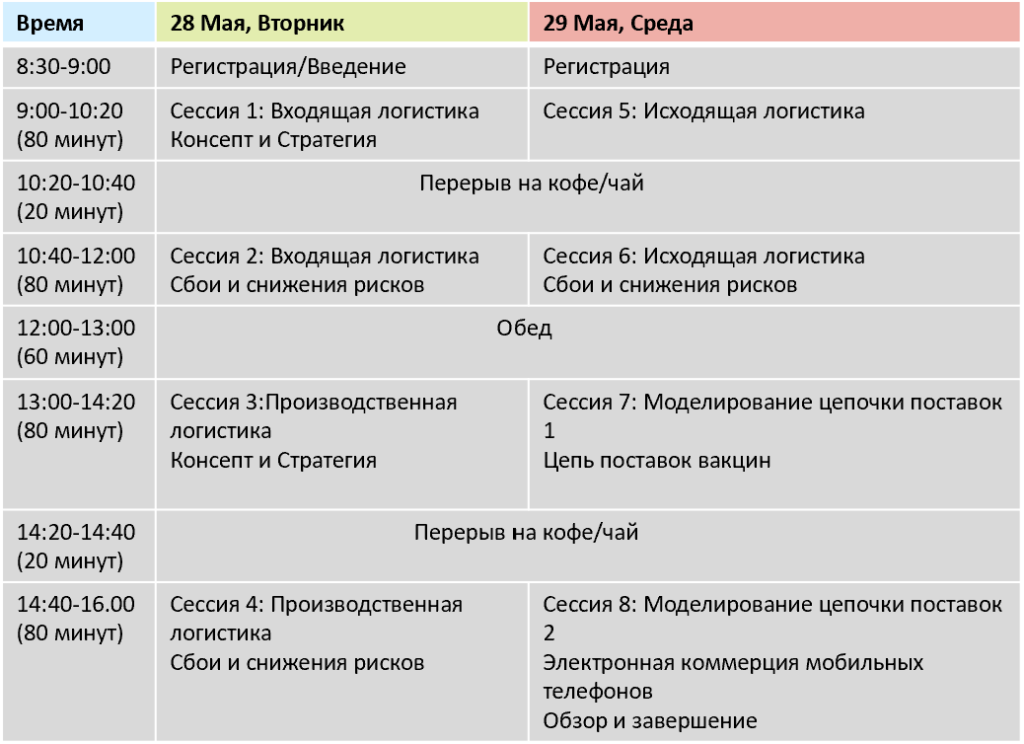
The 6th ACOSCM conference was recently held at the Logistics Institute of Central Asia.
The African Conference on Operations and Supply Chain Management (ACOSCM) is an international event primarily for academics, hosted by different universities in Africa on a rotating basis. In 2024, the 6th ACOSCM conference took place in Bishkek, Kyrgyzstan. ACOSCM aimed to establish itself as one of the leading academic conferences addressing logistics, supply chain management, and transportation issues in Africa.
Previous conferences were held in Nairobi (2022), Kigali (2021), Addis Ababa (2019), and Dar es Salaam (2018). The conference typically attracts around 100-120 scholars who present their research across various topic streams.
Each topic focused on contemporary issues relevant to the logistics industry or its customer sectors. In recent years, participants came from Senegal, Nigeria, Ghana, Ethiopia, Djibouti, Rwanda, Uganda, Kenya, Tanzania, Malawi, Mozambique, South Africa, Germany, Switzerland, Italy, Kyrgyzstan, the United States, the United Kingdom, and China.
We were honored to welcome distinguished Kyrgyz guest speakers, including:
🔹 Mr. Aidarbek Samykbaev, Head of the Department of Customs Policy and Infrastructure Development, Ministry of Economy and Commerce of the Kyrgyz Republic.
🔹 Mr. Avazbek Kerimbayev, Vice-President of the Chamber of Commerce and Industry of the Kyrgyz Republic.
The official language of the conference was English.
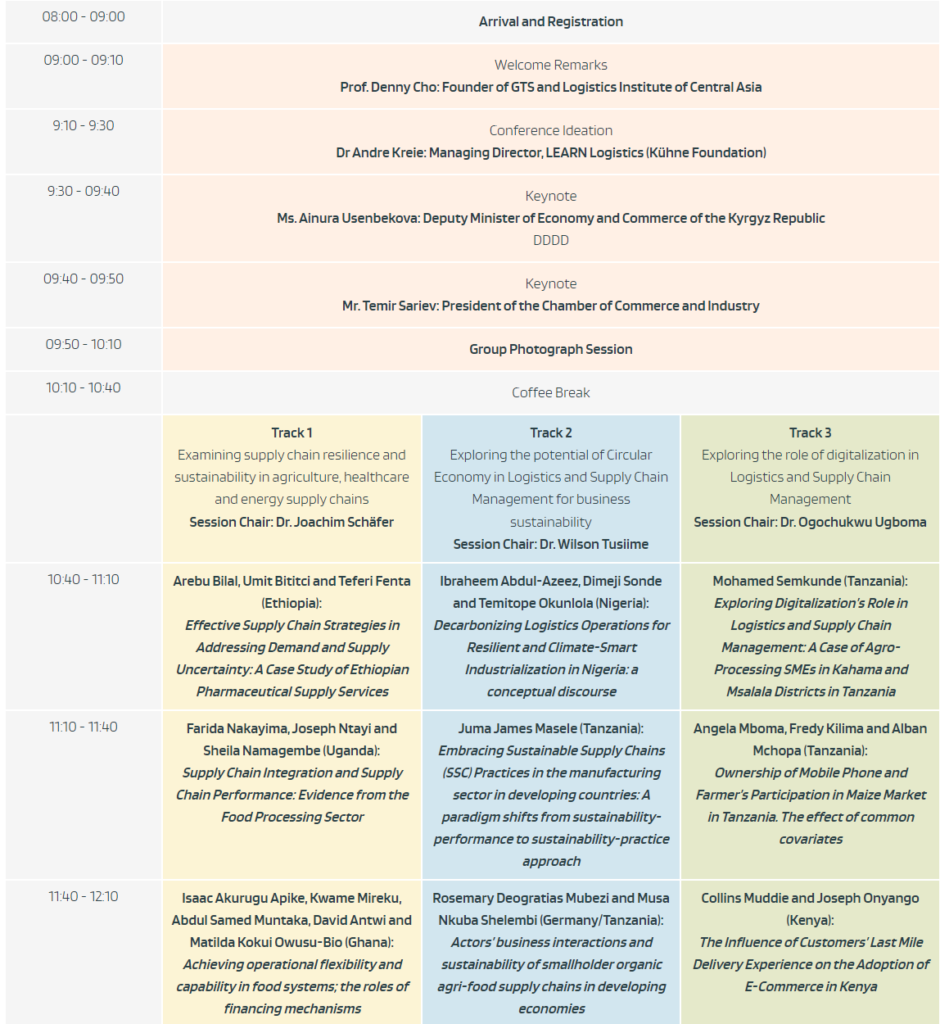
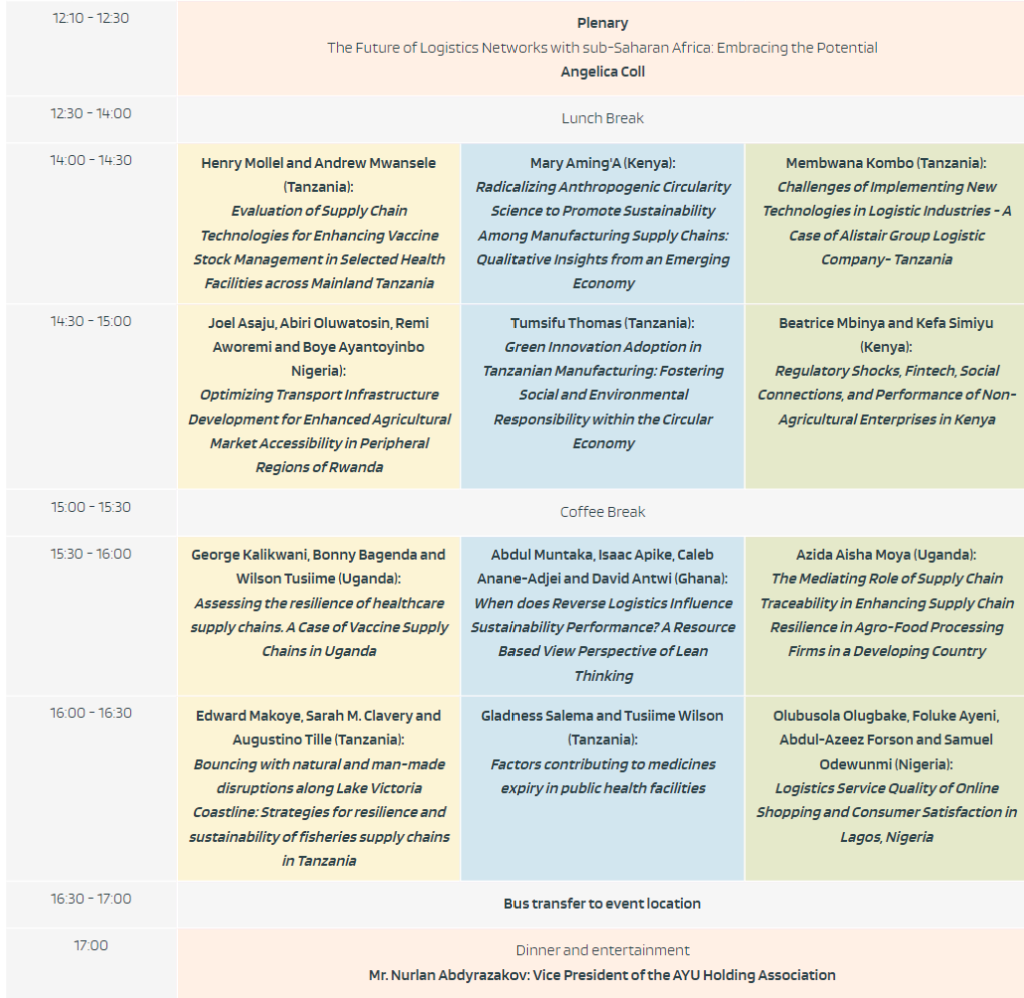
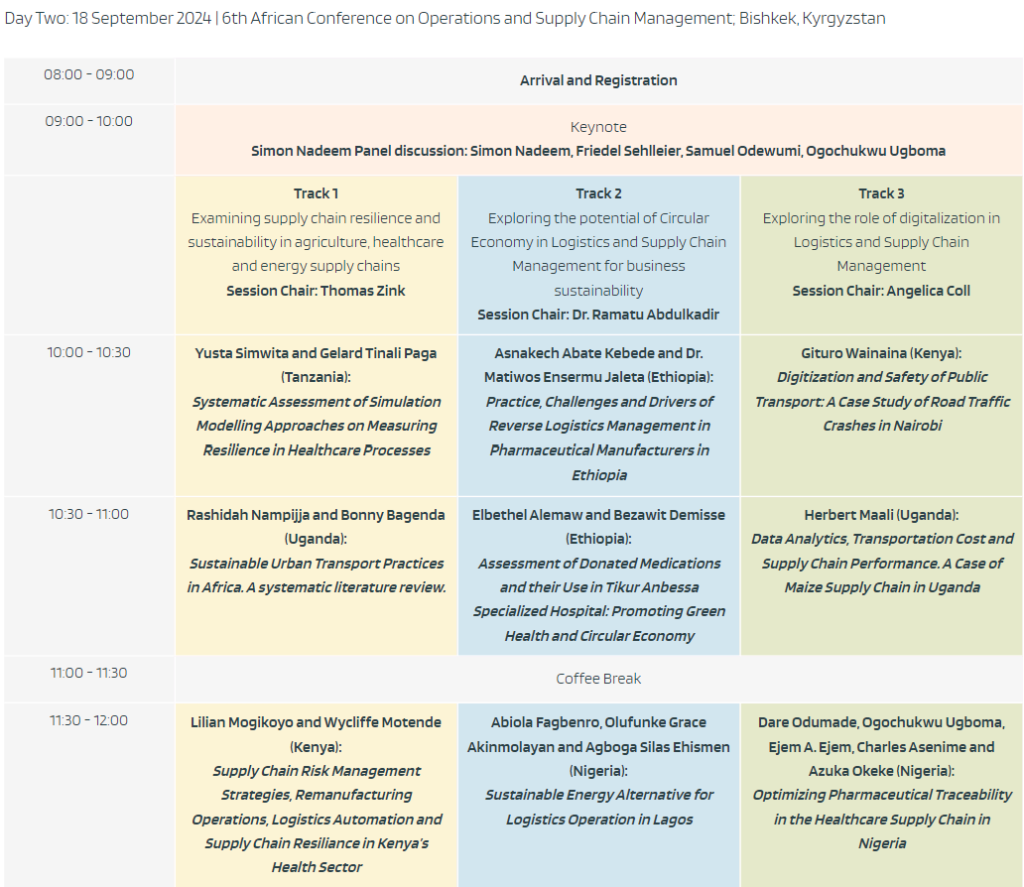
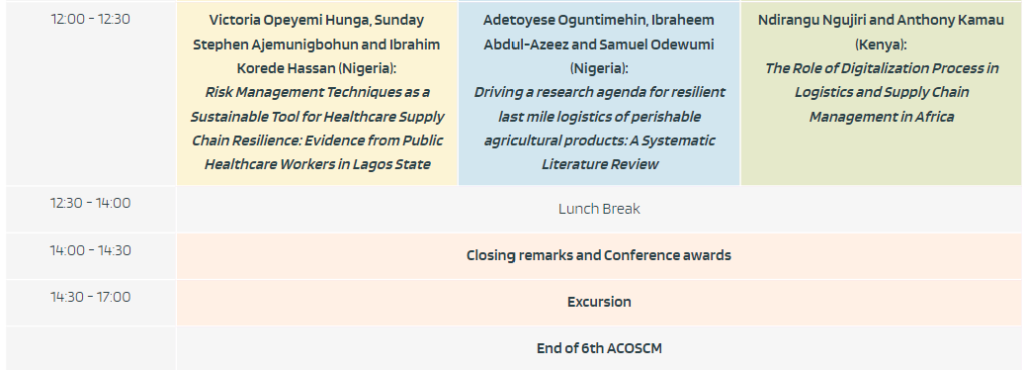
Copyright © 2024 ВСЕ ПРАВА ЗАЩИЩЕНЫ IPROFI.PRO